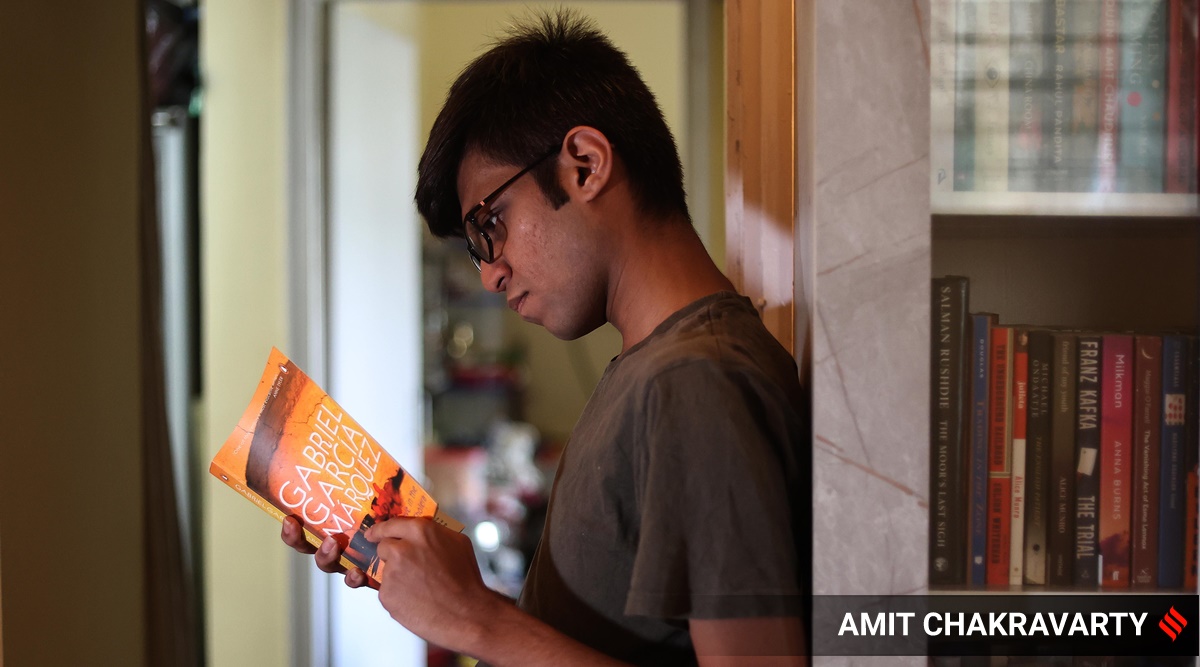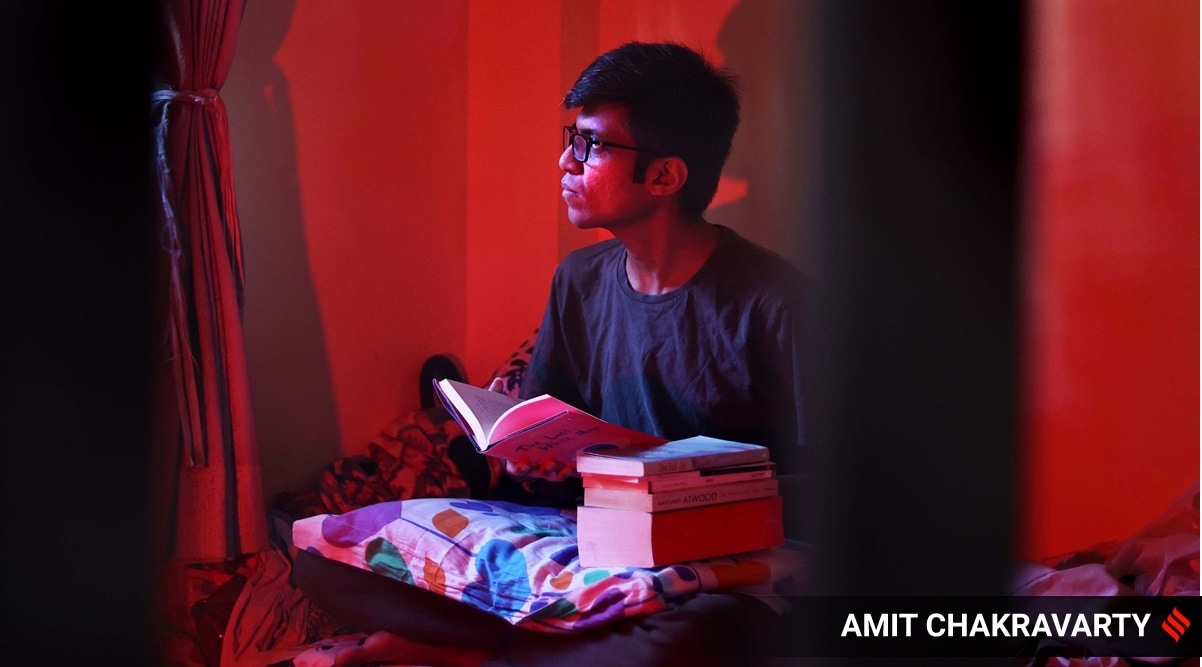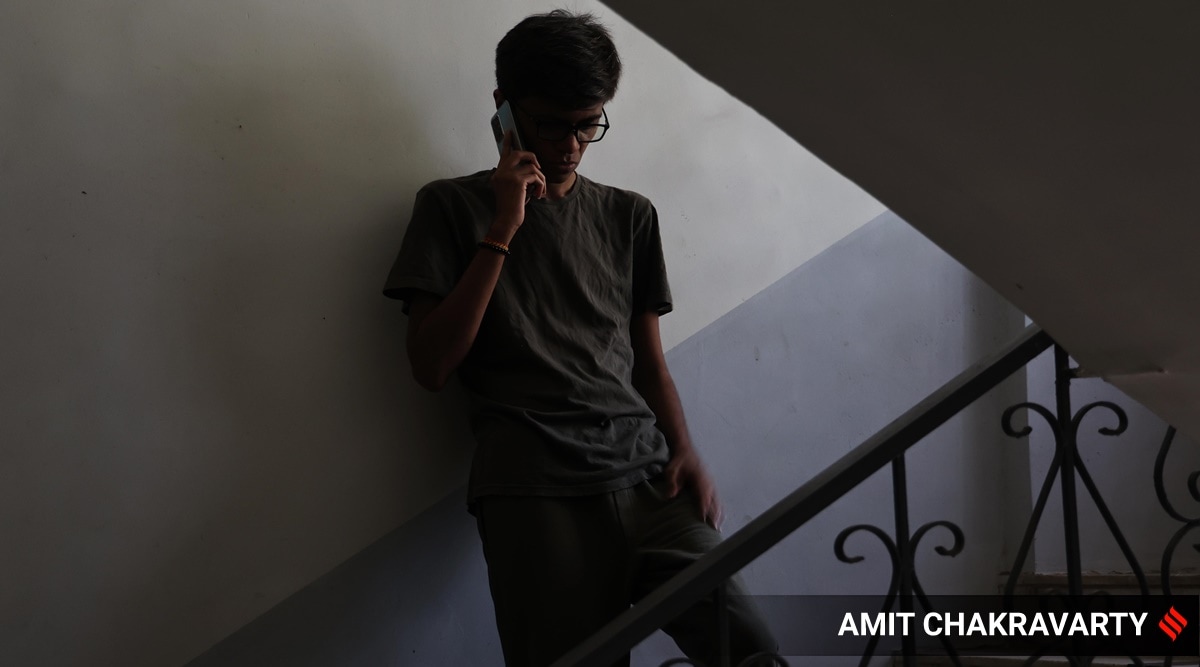30 tabs daily, hallucinations, 50 per cent chance to live: How Kunal, 26, fought multidrug-resistant TB - The Indian Express
When life throws you a curveball, there is only one way to tackle it. You get up and arm yourself, never to be hit again. This is what happened to 26-year-old Kunal Thakker, a photographer who picked up extreme drug resistant tuberculosis (TB) while documenting life in the slums. And while treatment of his stubborn condition confined him to a life at home, often bed-bound, he discovered the world of books, reading 40 of them during his therapies. But it was Sylvia Plath's The Bell Jar, revolving around a young woman's struggle to become a poet, which gave him hope. "Then I read inspirational books where the protagonists struggled to write their own life story" says Kunal, who has re-scripted his life — he is a bookstagrammer and recently started his YouTube channel on book reviews. After 18 months of turmoil, he was declared TB-free last December.
 "My father, who is also a TB survivor, wanted to know if I was resistant to any drug, " says Kunal. (Express Photo by Amit Chakravarty)
"My father, who is also a TB survivor, wanted to know if I was resistant to any drug, " says Kunal. (Express Photo by Amit Chakravarty) In early 2021, Kunal, a resident of Dahisar in the suburbs of Mumbai, was diagnosed with extensively drug-resistant tuberculosis (XDR-TB)—a form of TB which is resistant to at least four of the core anti-TB drugs. Even among XDR-TB patients, Kunal was a rarity: the strain of the disease he contracted had made him resistant to eight of the 13 available anti-TB drugs. He was resistant to the two most powerful anti-TB drugs, Isoniazid and Rifampicin, in addition to Levofloxacin, Kanamycin, Ethambutol, Capreomycin, Ethionamide and Pyrazinamide.
Since 2016, Kunal had been under treatment for asthma which stopped briefly during the pandemic. By the end of 2020, when he started showing symptoms of COVID-19 like coughing and breathlessness, his doctor restarted his treatment for asthma. Still he kept losing weight, which he blamed on his loss of appetite. "I was 70 kg in December 2020 but by the time I was diagnosed with TB in February 2021, I had lost 18 kg as my weight slipped to 52 kg. I was too weak to even stand…" recollects Kunal, who was admitted to a COVID facility after he developed high fever and his oxygen levels dipped to 88. He tested negative but the doctors insisted on a lung X-ray just to be sure. This showed multiple light areas (opacities). A sputum test confirmed TB. "My father, who is also a TB survivor, wanted to know if I was resistant to any drug. So, finally in the third week of March, I underwent two sets of bronchoscopy" says Kunal, who had by then spent Rs 90,000 in diagnostic tests. To his horror, the first report after a week of bronchoscopy showed that he was resistant to two anti-TB drugs. "You never think such things will happen to you until they do. Then I realised that I had a 50 per cent chance of survival," he adds.
 And while treatment of his stubborn condition confined him to a life at home, he discovered the world of books. (Express Photo by Amit Chakravarty)
And while treatment of his stubborn condition confined him to a life at home, he discovered the world of books. (Express Photo by Amit Chakravarty) He registered at Dahisar government hospital where the regimen for multi-drug resistant TB started. On March 16, Kunal got his first anti-TB injection, a "hellish experience." Recalling those days, Kunal says, "I was experiencing ringing in my head and everything was blurred. I couldn't explain what was going on in my brain. It was the most awful, foggy experience." To add to his worry, another report that came the next day — March 17 — further revealed that he was resistant to two more drugs. His mother, Priti Thakker, 62, a strict vegetarian, broke kitchen discipline to boil eggs for her emaciated son, who would often groan in pain. By April 25, it was confirmed that Kunal was resistant to a total of eight drugs.
Subscriber Only Stories
With the help of Dr Daksha Shah, deputy executive health officer of the Brihanmumbai Municipal Corporation (BMC), Kunal was put on a regime of Bedaquiline. It is the only anti-TB drug, the first of its kind in 50 years, that targets the energy metabolism of mycobacteria, inhibiting the mycobacterial ATP synthase.
 Kunal, has re-scripted his life — he is a bookstagrammer and recently started his YouTube channel on book reviews. (Express Photo by Amit Chakravarty)
Kunal, has re-scripted his life — he is a bookstagrammer and recently started his YouTube channel on book reviews. (Express Photo by Amit Chakravarty) Though the source of infection couldn't be identified, Kunal, who visited several slums as a photographer, believes that he contracted the infection from one of the XDR-TB patients. "I always knew that XDR-TB happens due to irregular medication among already infected patients. But later, I was told that XDR-TB also spreads the same way as any other forms of the TB bacteria," he says.
His physician and pulmonologist, Dr Parthiv Shah, says Kunal was exposed to someone with XDR-TB. "Bacteria are released into the air when a person with TB coughs, sneezes, shouts, or sings. These bacteria can float in the air for several hours, depending on the environment. The strain that infected Kunal was quite rare as it was resistant to eight out of 13 drugs," he explains.
Advertisement
Kunal's real struggle started from the day he started therapy. Everyday, he had to take 26 pills for his TB and asthma which took a toll on his mental health. He kept hallucinating and developed an anti-tuberculous agent–associated psychosis.

After 18 months of turmoil, Kunal was declared TB-free. (Express Photo by Amit Chakravarty)
Sharing an incident, Kunal recalls the day he was eating a chocolate and in his mind thought that it had got stuck in his throat. Despite his family's repeated assurance, he wasn't convinced and had to be rushed to hospital for a CT scan. "It is not like I didn't trust them but my throat kept hurting and my brain kept telling me that I was choking," he says. In the washroom, he would often get agitated if he saw strands of hair on the floor.
His headache got more severe with time. He felt like someone was hammering him and underwent two CT scans to overrule any doubts. These bouts of hallucination affected his mental health to such an extent that he started having suicidal thoughts. In June 2021, he decided to take psychiatric help. "I knew I wasn't my real self. It wasn't me…the medicines cause delusions, auditory and visual hallucinations," he recalls.
Advertisement
 Kunal Thakker is a photographer who picked up extreme drug resistant tuberculosis (TB) while documenting life in the slums. (Express Photo by Amit Chakravarty)
Kunal Thakker is a photographer who picked up extreme drug resistant tuberculosis (TB) while documenting life in the slums. (Express Photo by Amit Chakravarty) His psychiatrist immediately put him on medication which increased his daily intake of tablets to 30. Gradually, the buzzing sound in his brain became silent and he developed a new hobby— reading. "I survived the BMC's treatment process with help from my psychiatrist. I wouldn't have been able to continue with my regime otherwise," he says.
Now, Kunal weighs 58 kg but the trauma of the last two years still sends a chill down his spine. "TB is not a disease of the poor, it can happen to anyone. Timely diagnosis, treatment and nutritious food are the only way to fight it. Of course, I learnt about life's purpose through my books," he says.

Comments
Post a Comment